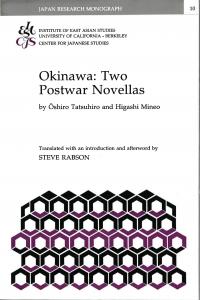Okinawa
Okinawa
Steve Rabson, trans.
This volume contains two novellas in translation, along with an introduction providing historical background and a concluding essay that compares and evaluates the works. Set in the 1960s, "Cocktail Party" is the story of a man whose daughter is raped by an American soldier. "Child of Okinawa" is told through the eyes of a young boy in the 1950s growing up in a bar/brothel that his parents run near a large American military base.
As a nonprofit academic press, we need your support to publish our books. Your gift can help us make more of our titles available as e-books. DONATE NOW
Title information
This volume contains two novellas from Okinawa in translation, along with an introduction providing historical background and a concluding essay that compares and evaluates the works. Set in the 1960s, "Cocktail Party" is the story of a man whose daughter is raped by an American soldier. "Child of Okinawa" is told through the eyes of a young boy in the 1950s growing up in a bar/brothel that his parents run near a large American military base. In telling the stories of their protagonists, the authors Ōshiro Tatsuhiro and Higashi Mineo extract such experiences from the mesmerizing context of newspaper headlines and television "sound bites," bringing them to an intensely personal level that is the special realm of literature.
Steve Rabson, trans.
Steve Rabson is professor emeritus of East Asian studies at Brown University.
Ph.D. Harvard University
Okinawa (JRM 10)
Preface – ix
Introduction – 1
Cocktail Party – 31
Child of Okinawa – 79
Afterword – 119
About the Authors – 133
Bibliography – 135
|
JOURNAL REVIEWS |
|
"In this slim volume, Steve Rabson provides a valuable introduction to the works of Oshiro Tatsuhiro (b. 1925) and Higashi Mineo (b. 1938), two prominent Okinawan authors who are concerned with the imposing presence of America in postwar Okinawa….The translations are, for the most part, smooth and well-paced....Both Rabson's historical introduction and the two novellas deserve a close reading by anyone interested in modern Japanese literature and history." ~Ann Sherif, Case Western Reserve University, in Journal of Asian and African Studies 26, no. 3–4 (July 1991): 318–319. |

